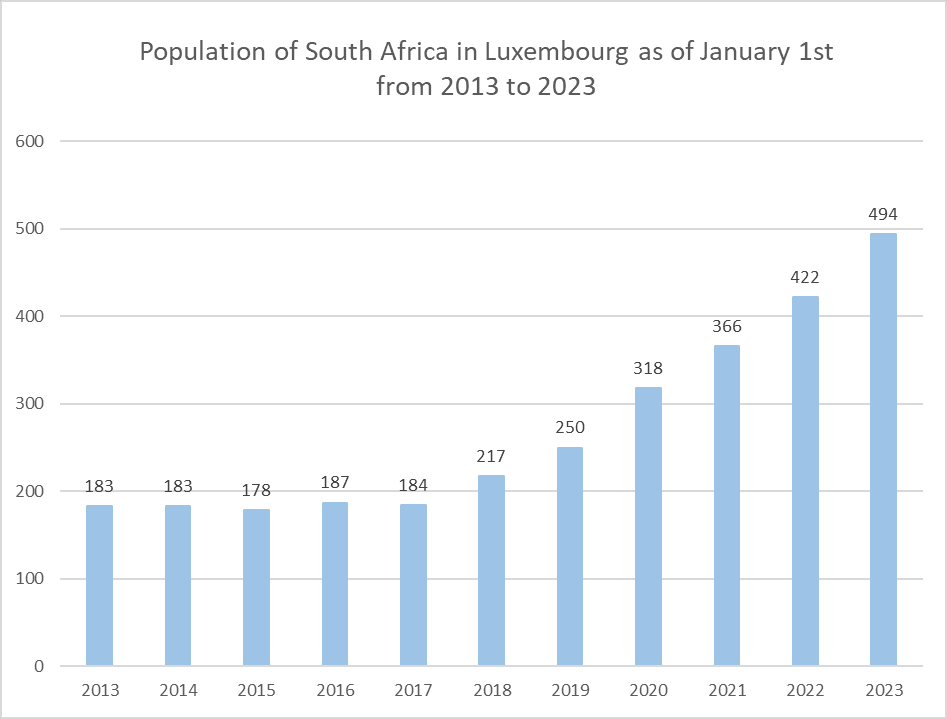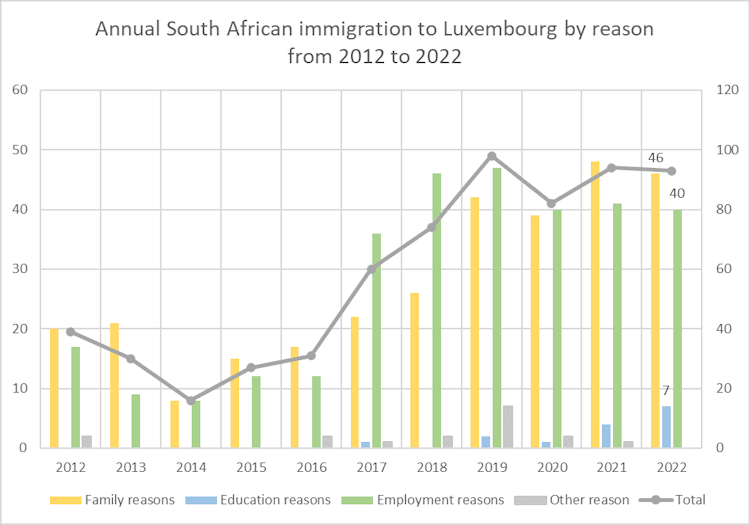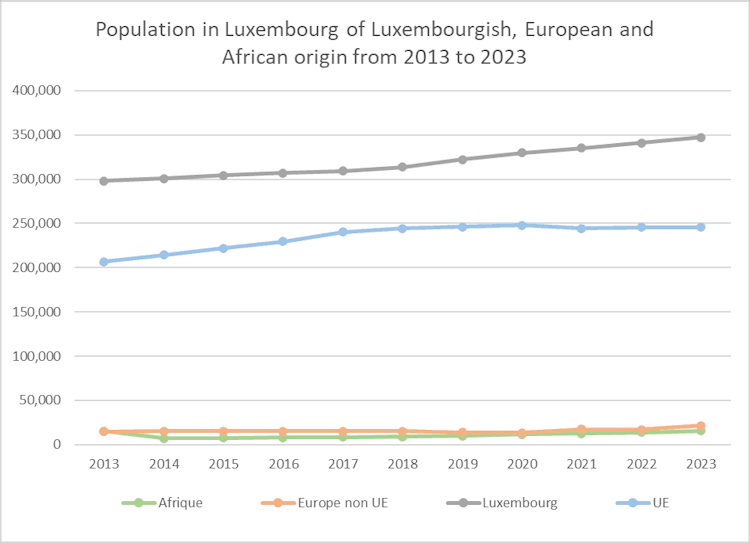
How to obtain a visa to Luxembourg for South African nationals
Applying for a visa involves navigating intricate requirements and paperwork with application procedures that can be overwhelming and complicated, especially for first-time applicants. If you're a South African citizen seeking a tourist, study, or work visa for Luxembourg from South Africa, you'll encounter all of this. To guide you through this process, we present a comprehensive article to obtaining a visa for Luxembourg from South Africa.
Despite being the least populous country in the European Union, Luxembourg has become a highly sought-after and multicultural destination, with nearly half of its population consisting of expatriates. However, immigration patterns vary, and South African immigration to Luxembourg is somewhat limited, with only 494 individuals in the country. Nevertheless, it ranks among the top 10 African countries with a presence in Luxembourg, reflecting its growing significance.
How many South Africans live in Luxembourg?
The South African population in Luxembourg is relatively small compared to other nationalities, largely due to the challenges involved in meeting immigration requirements for many South Africans wishing to emigrate. However, there is a notable number of South Africans settled in the country, with a few newcomers arriving each year. Let's delve into the statistics to precisely understand how many South Africans live in Luxembourg, how many arrive each year, and their percentage in relation to the total population and other foreign communities.

Currently, there are 494 South African citizens in Luxembourg. Looking at the trend over the last decade, there was initially significant stability from 2013 to 2017, with around 180 individuals. However, from 2018 onwards, the number of South Africans steadily increased, multiplying the population by 2.7 in five years.
Another interesting aspect to analyze alongside the absolute number of South Africans in the country is how many arrive to live each year and their primary motives. From 2013 to 2017, around 25 individuals immigrated annually. However, starting in 2017, the number of immigrants began to rise, reaching 60, 74, and 98 individuals in the following three years. In the last three years, the number has stabilized around 90 individuals.
South African immigrants come to Luxembourg primarily for family and work reasons, with 46 and 40 individuals in each category, respectively in 2022. Only a small number come to study in the country, with just 7 individuals in 2022. This can be attributed to the high cost of living in Luxembourg. While this may not pose a problem for those working in the country due to the relatively high salaries, it serves as a significant barrier for students who often rely on family support or limited part-time jobs to sustain themselves.
Total population
Regarding the percentage of the South African population, it is very small. South Africans represent only 0.07% of the total population and 0.17% of the foreign population in Luxembourg. In fact, the African population as a whole in Luxembourg is quite low, with the majority of the foreign population originating from the European Union. However, it's worth noting that South African nationality in Luxembourg is among the top 10 African nationalities represented in the country.
Types of Luxembourg visas for South Africans
When obtaining a visa for Luxembourg from South Africa, there are two main options depending on the duration and nature of the stay: short-stay visas and long-stay visas. Additionally, if the intended period of stay in Luxembourg is longer than one year, it will be necessary to apply for a residence permit, so we will also address this point and explore the types of residence permits available.
It's important to note that the types of Luxembourg visas available for Africans, as well as the procedures for obtaining them, are the same as those for any non-European foreigner.
Official government site
You can find more information about short and long-stay visas on the government's dedicated page at guichet.lu.
Short-stay visas for Luxembourg
Those intending to enter the country for a brief period should apply for a short-stay visa, also known as a type C visa. This visa allows transit or stays in Luxembourg and the Schengen area for a maximum of 90 days within 180 days.
Long stay visas for Luxembourg
Individuals planning to stay in Luxembourg for more than three months must apply for a long-stay visa, also known as a type D visa. In many cases, this visa is a necessary preliminary step for those aiming to become residents in Luxembourg.
Long-stay visa is intended for
- Holders of a temporary residence permit.
- Holders of a work permit for paid employment.
- Those who are going to join a family member who is an EU citizen.
- Those who want to carry out any other type of activities such as self-employed work, studies, research, or sports activities.
Work permit
Before applying for a D visa, you must request a work permit from the Luxembourg Ministry of Foreign and European Affairs.
Luxembourg Residence permits for South African nationals
If you plan to live in Luxembourg for more than a year and wonder how to relocate to Luxembourg from South Africa, you must consider that the process goes beyond obtaining a visa. While obtaining a long-stay visa (type D visa) is necessary, it's only the first step; you also need to obtain a residence permit.
There are many types of residence permits based on the intended activities and family relationships of the applicants. Below are the different types of permits classified by categories.
What is a titre de sejour?
Unlike a visa, a residence permit grants individuals the right to reside and engage in specific activities in Luxembourg for a more extended period. There are various types of residence permits based on the activities individuals plan to undertake in Luxembourg and their family relationships.
Some of the situations that have attached a specific resident permit or have a specific procedure include:
Each residence permit has its own set of requirements and procedures for application. These may include demonstrating specific qualifications, providing proof of employment or sponsorship, showing sufficient financial means, and adhering to the necessary documentation and administrative procedures.
Check our relocation guide for salaried workers

Application process for Luxembourg visa step-by-step
If you are wondering, how can I apply for a Luxembourg visa in South Africa, this section will answer your questions. The process involves crucial considerations such as deciding on the purpose of entry, gathering necessary documents, and finally submitting your visa application, so let's look at each step in more detail.
Decide on the grounds for entry
Clarifying the purpose of your entry into Luxembourg is the first step in the visa application process. There are different reasons for visiting Luxembourg, each requiring a specific type of visa and corresponding application procedures.
Tourist or family visits
Business entry to Luxembourg
Employment in Luxembourg as ground
Study related entry
Family reunification as entry ground
Private reasons as ground for entry
Collect the documents
Before proceeding with the visa application process, it's essential to ensure you have all the necessary documents in order. While the specific documents may vary depending on the type of visa and individual circumstances, there are general documents that are commonly required for most visa applications.
Below is a comprehensive list of the Luxembourg visa requirements for South African citizens; however, it's important to note that additional documents may be necessary depending on the specific nature of your case. Ensure thoroughness in assembling the following documents to strengthen your application and facilitate a smooth processing experience.


Piece of advice
Depending on the type of visa, especially for short-term tourist visas, you may need to show a travel itinerary. Although there is the option of getting the airline ticket, this option is certainly a risky bet, as you are not sure of many things, including whether you will get visa approval. So, instead of emptying your pocket on buying an actual ticket, a generally accepted option is to submit a flight itinerary reservation.
Apply for necessary papers to stay in Luxembourg
The application process differs depending on whether you're applying for a C visa or a D visa. In both cases, you'll need to visit the Luxembourg Embassy.
There isn't a Luxembourg embassy in South Africa. You'll need to contact the Embassy of Belgium in Pretoria or the Consulate General of Belgium in Cape Town, which serves as diplomatic representations of Luxembourg.
For other countries residents from South Africa
If you reside in another country, you should approach the Luxembourg embassy in your country of residence. The website of the Luxembourg Ministry of Foreign and European Affairs provides a list of all Luxembourg embassies worldwide.
Applicaiton for a C visa
You must request an appointment at the Embassy of Belgium in Pretoria or the Consulate General of Belgium in Cape Town, ensuring that the appointment day falls at least 15 days before the planned visit and no more than 6 months before it begins. On the day of the appointment, you'll need to personally bring all the required documents and submit your application.
Visa to Luxembourg
Application for a D visa
The process consists of two steps. First, you will need to apply for a temporary authorisation to stay, then submit a long-stay D visa application, when you are granted the approval of your stay from the Ministry.
This application is divided into three steps.
How long does it take to get a Luxembourg visa from South Africa?
Question of time
Applications for a Short-stay C visa are typically resolved within 15 days from the date of filing.
In Luxembourg, the processing time for short-stay C visas is normally completed within 15 days from the date of application. However, in certain circumstances, the process can take up to 30 or even 45 days.
The processing time for a long-stay D visa varies based on the activities you intend to undertake in Luxembourg. The most influential aspect on the processing duration is obtaining temporary stay authorization. The Immigration Directorate has different response times depending on the type of visa requested.
| Visa type | Deadline (months) |
| Highly qualified workers | 4 |
| Employed workers | 3 |
| Seasonal workers | 4 |
| Athletes or coaches | 3 |
| Researchers | 4 |
| Au pair workers | 2 |
| Investors | 3 |
| Self-employed workers | 3 |
| Volunteer workers | 2 |
| Students | 2 |
| Students in an exchange program | 3 |
| Internship for students | 2 |
| Family members of third-country nationals | 9 |
| Private reasons | 3 |
Common reasons for visa rejection
Here are some key reasons why a visa application might be rejected. Take a careful look at these points to ensure the smooth processing of your application.






What to do if your visa got rejected unlawfully?
If your visa application is rejected, you can appeal the decision to the Administrative Tribunal. The appeal must be filed by a lawyer within 3 months from the notification of the resolution. You can find more information on how to proceed with this process on the government's dedicated page at guichet.lu.
How much it costs to get a visa to Luxembourg?
Finally, let's address a crucial detail: the Luxembourg visa price for South Africans. The following table outlines the costs according to the type of visa. The cost of the visa will be determined based on the fees you need to pay in order to get it. A standard consular fee varies depending on the personal situation and status.
Besides, you will need to translate necessary documents, pay for the photos, and other visa-related expenses, but these costs are usually depending on your personal situation.
| Type of visa | Fee in EUR | Fee in ZAR |
| Short-stay visa (C) | 90 | ~ 1,737 |
| Long-stay visa (D) | 50 | ~ 965 |
| Visa for children between the age of 6 and 12 | 45 | ~ 869 |
| Visa for children under 6 years of age and visas for pupils, students, and teachers accompanying them on school trips or educational study trips. | Free | Free |
| Visa for researchers going abroad to carry out scientific research. | Free | Free |
| Visa for representatives of non-profit making organizations aged 25 years at most who participate in seminars, conferences, or sports, cultural or educational events. | Free | Free |
| Visa for family members of an EU/EEA national | Free | Free |
Prices have changed
In June 2024, the fee for a Schengen visa increased. The revenue generated from visa applications will be reinvested to provide more resources, including staff, to process visa applications. This should reduce the waiting time for a Schengen visa appointment.
Application for a residence permit in Luxembourg for South Africa
If you plan to stay in Luxembourg for an extended period, you'll likely need to apply for a residence permit in addition to the long-stay D visa. This process involves three additional steps.
Within 3 days of arriving in Luxembourg, you must submit an arrival declaration to the municipal authorities of your residence. Required documents include:
- A valid ID (passport, visa, or residence permit issued by another EU member state);
- The long-stay visa;
- A proof of address (such as a lease agreement or utility bill).
Keep the receipt
Upon submission, you'll receive a copy of the declaration as confirmation. You will need to send it with your package of documents for the Residence Permit.
The next step is to undergo a medical examination promptly, which comprises two tests:
Upon receiving the results, the Health Inspection of the Ministry of Health will issue a medical certificate and send it to the Immigration Department of the Ministry of Foreign and European Affairs for the residence permit application approval.
The application for a residence permit must be submitted within 3 months of arriving in Luxembourg to the Immigration Department of the Ministry of Foreign and European Affairs. This can be done online through MyGuichet.lu or by mail by sending the residence permit application form to the Ministry of Foreign and European Affairs.
In both cases the following documents will be required:
- Copy of the passport;
- Copy of the visa;
- Copy of the declaration of arrical, issued by the commune office;
- Proof of suitable accommodation, such as a lease agreement, property deed, or other relevant documents;
- Proof of a 80 euros fee payment to the account IBAN LU46 1111 2582 2814 0000 (BIC: CCPLLULL, beneficiary: Ministry of Foreign and European Affairs, Immigration Department; communication: residence permit for...).
What happens after application?
Upon approval, the applicant will receive a letter inviting them to schedule an appointment at the Immigration Department for a photo session and fingerprinting, which will be incorporated into the residence permit.
A few days after providing biometric data, the applicant will receive a notice to personally collect their residence permit card.
Frequently Asked Questions (FAQ)
How long does it typically take to get a Luxembourg visa from South Africa?
The processing time for a Luxembourg visa from South Africa can vary depending on the type of visa and individual circumstances. Generally, for short-stay visas (C visas), the processing time is around 15 days from the date of application submission. However, it's important to note that there is no Luxembourg embassy in South Africa, so applicants need to apply through the Belgian Embassy in Pretoria or the Consulate General of Belgium in Cape Town. This process might extend the processing time to a maximum of 30 days. For long-stay visas (D visas), the processing time can be longer as it involves additional steps such as obtaining temporary authorization to stay, which can vary based on the activities intended in Luxembourg.
How much does it cost to obtain a Luxembourg visa for South African nationals?
Is travel health insurance mandatory for a Luxembourg visa application from South Africa?
Can I travel to other Schengen countries with a Luxembourg visa?
Source: statistiques.public.lu, guichet.public.lu, guichet.public.lu, guichet.public.lu, mae.gouvernement.lu, guichet.public.lu, guichet.public.lu, guichet.public.lu, guichet.public.lu, guichet.public.lu, guichet.public.lu, guichet.public.lu
We took photos from these sources: Jacques Nel on Unsplash, self-made graphs with information from statistiques.public.lu and Eurostat


